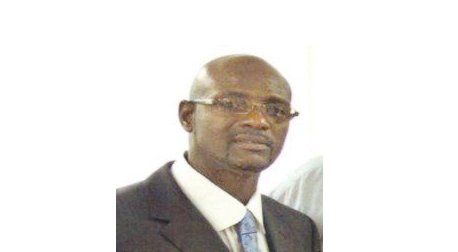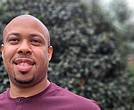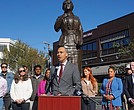Family seeks criminal charges in Taser death by police
Joey Matthews | 2/18/2016, 7:29 a.m.
Gwendolyn Smalls said not a day goes by that she and her family don’t feel anguish over the inhumane and unnecessary death of her 46-year-old brother, Linwood R. Lambert Jr.
The former Richmond resident died nearly three years ago while he was in the custody of three South Boston police officers who fired 20 Taser shots at him while his hands and legs were shackled.
Ms. Smalls, a 48-year-old South Boston resident, recalled the nightmarish May 4, 2013, incident and her quest for justice for her deceased brother during the 4th Annual State of Black America Address for Central Virginia last Saturday at Thirty-first Street Baptist Church in the East End.
The incident made national headlines in November 2015 after the MSNBC cable network aired a graphic video they obtained showing Mr. Lambert being tased by police while outside a South Boston hospital and inside a police car.
“It’s difficult to imagine what it was like to hear that he died,” Ms. Smalls told the Free Press prior to speaking at the church event. “But when we see the video, it’s very devastating. So each and every day we have to be reminded of it when we watch the media or see another article in the newspaper.
“We’re not at rest and we want these officers arrested,” she added. “We want them charged. That would give us some type of closure.”
The officers, who are white, had taken Mr. Lambert into custody after they responded to a noise complaint at a South Boston motel. They were taking him to a hospital for a mental health evaluation, according to court documents.
During transport, he told them he had taken cocaine earlier in the evening. Disoriented, he tried to kick out the rear windows of the police car after they arrived at the hospital. He then got out of the car and fled the officers to the hospital entrance, where he fell to the ground.
The video shows the police officers repeatedly shooting Mr. Lambert with Tasers. Instead of taking him inside the hospital for medical attention, they put him back inside the police vehicle and took him to jail.
When the officers found him to be unresponsive, an ambulance took him to the same hospital, where he was pronounced dead.
According to an autopsy report, Mr. Lambert died of “acute cocaine intoxication.”
Ms. Smalls called those findings false and alleges a cover-up by authorities of her brother’s death. She and others claim he died of cardiac arrest after being Tasered repeatedly.
Ms. Smalls has filed a $200 million lawsuit against the City of South Boston, its police department and each of the three officers involved in the incident. She is being represented by the Philadelphia law firm of Messa & Associates.
“I’m going to continue to tell my brother’s history,” promised Ms. Smalls. “If you hold a Taser on someone every five seconds, that’s a shock of 50,000 volts,” she said. “The Tasers were held on him for 87 seconds. So you do the math.”
Ms. Smalls said the three officers who tased Mr. Lambert are seeking qualified immunity in the lawsuit, which is to be heard May 16 through 20 in U.S. District Court in Danville.
Richmond Commonwealth’s Attorney Michael N. Herring explained that means the claims against the officers in the suit would be dismissed if the court rules that their conduct did not violate “a clearly established right or legal standard.”
At that point, he said, the lawsuit likely would be dismissed.
Mr. Herring told the Free Press on Tuesday his office was enlisted “on a consulting basis” by South Boston Commonwealth’s Attorney Tracy Q. Martin in February 2015 to examine the information related to Mr. Lambert’s death to help determine if the officers should be prosecuted criminally.
Ms. Smalls said the main lesson she has learned from her brother’s death and what she would impart to others in conflict with law enforcement is to investigate and verify the truth for themselves.
“During the process of my discovery, no one told me the same story twice,” she said. “It made me not trust the authorities and the information they were providing to me.
“I would say not to believe what is told to you, but instead to wait, question, investigate, and do your own discovery until you come to a conclusion that you’re happy with, that you believe happened to your loved one.”







